Hi Guys,
This article on Greek Warrior Names was born on the Manhood : A Lexicon word list, and it's still there.
But I decided, because it's an important article, to give it its own page on Ares Is Lord as well.
However, on this page, the links to the word list on Manhood : A Lexicon -- will not work.
So on this page, you should read only for the text -- not the links.
Be that as it may, if you're serious about Ares Is Lord and the Alliance, this is an important article for you to read.
So just start here with Eury-sthenes, comrade and warrior brother of Plei-sthenes, and learn all you can.
Bill
From:
Eurus = wide, broad, far-reaching, far-spread ; and
Sthenos = strength, might ; strength, might, of all kinds moral as well as physical
Eury-sthenes is one of the Dorian twins (the other is Prokles) who become the progenitors, through their sons, Agis and Eurypontus, of the two lines of the kings of Sparta : the Agiads and Eurypontids.
Leonidas I, for example, is an Agiad, the 17th Agid king.
Slater, in his Lexicon to Pindar, defines the name Eurysthenes as of wide power, powerful, [epith.] of Gods and Heroes ; Autenrieth, in his Homeric Dictionary, as widely powerful, with far-reaching might, epith. of Poseidon
Related:
Eurybias = Eurysthenes = of far-extended might, mighty
From Eurus -- far-reaching, far-spread ; and Bia -- bodily strength, force, power, might ; force, an act of violence
Related:
Eurybiadas : Son of Far-Extended Might, Son of Far-Extended Violent Force
Ευρυβιαδας
Bill Weintraub:
You'll notice that according to Liddell and Scott, the two ancient Greek Warrrior names, Eurysthenes and Eurybias, mean the same thing or close to it -- of far-extended might, mighty
Although arguably Eurybias can mean "of far-extended violent force" ; and thus, given that the des or das suffix is often a patronymic, Eurybiadas can mean Son of Far-Extended Might, Son of Far-Extended Violent Force.
Which is a good introduction to a discussion of ancient Greek Warrior Names.
So :
There are five words which occur frequently in ancient Greek Warrior names :
To be clear, these are not the only five words which occur frequently in Warrior names.
There are more than 35,000 Greek proper names -- so there are many words which occur frequently in Warrior names, to which the Greeks applied their very great ingenuity and invention.
Nonetheless, these five are particularly useful in looking at and understanding the function and meaning of Greek Warrior names :
So :
We see that Machos means "in fight" or "in battle" ;
And that Kratos, Menos, Sthenos, and Bia can all be translated as "strength and might" ;
And that Bia has the additional meaning of "violence, and violent force."
That said, however, we need to be clear that *all* five words are about not just Fighting, Strength, and Might -- but also Violence, and Violent Force -- indeed, about what we can call Manly Violent Bodily Force --
Because that Force, that Violent Force, that Violent Bodily Force, which is Manly because it partakes of Manhood, Fighting Manhood -- is an integral part of Fighting, Strength, and Might among the ancient Greeks -- whether referred to implicitly, or explicitly.
So that we can see that all five words are about Fighting and the attributes needed to Fight -- which includes Manly Violent Bodily Force :
Related:
Biao : I. to constrain ; Pass. to be forcibly driven ; II. as Dep. in act. sense, to constrain, press hard, overpower ; to force or urge on,
Biao = Biazo :
Biazo : I. to constrain ; Pass., to be hard pressed or overpowered, ; II. to overpower by force, press hard ; to do violence, to lay violent hands on, to force ; absol. to use force, struggle, to force one's way
Biazo derives from Bia
Related:
Biaiomachas : fighting violently, Anth.
From:
Related:
Biaios : I. forcible, violent, erga biaia εργα βιαια violent deeds, Od. ; βιαιος θανατος a violent death, Hdt., Plat., etc. ; ο πολεμος βιαιος διδασκαλος war is a teacher of violence, Thuc. : adv., βιαιως by force, perforce, Od., Aesch., etc. ; so, προς το βιαιον, Aesch. ; II. pass. constrained, compulsory, Plat.
Related:
Biasteos : one must do violence to, Eur.
kratos aristeias κρατος αριστειας = the meed of highest valour
Related:
Krateo : to be strong, mighty, powerful ; to rule, hold sway, be sovereign ; to rule among ; to be lord or master of, ruler over ; to conquer, prevail, get the upper hand ; to conquer, master, outdo, surpass ; to become master of, get possession of ; to lay hold of, to seize, hold fast, to control, command
Related:
Kratuno : to strengthen, to harden ; to rule, govern, to become master, get possession of
Related:
Kratistos : a superlative formed from κρατυς κρατος strongest, mightiest, kratiste mache κρατιστη μαχη the fiercest fight, Iliad ; generally, best, most excellent, as superlative of agathos αγαθος ; hoi kratistoi οι κρατιστοι, like hoi beltistoi οι βελτιστοι of the aristocracy ; the comparative in use is kreisson κρεισσων
Related:
Krateros : epic form of Karteros καρτερος : strong, stout, mighty ; of things, conditions, etc., strong, mighty, cruel
; of passions, strong, vehement, mighty ; as an adv., strongly, stoutly, roughly
Related:
Enkrates : in possession of power ; holding fast, stout, strong ; having possession of a thing, master of it, enkrates eautou εγκρατης εαυτου master of oneself, Plato ; with a strong hand, by force
Related:
Enkrateia : mastery over a person or thing, enkrateia eautou εγκρατεια εαυτου self-control, Plat. ;
absol. self-control, Lat. continentia
Related:
Enkrateo : to be master of, exercise control over
Related:
Akrateia : incontinence, want of self-control
Derives from
Akrates : powerless, impotent, without command over oneself, intemperate, incontinent, a weakling, UN-strong
μαχη
Machetes : a fighter, warrior
Related:
Machemon : warlike
Related:
Macheteos : one must fight
Related:
Machetikos : inclined to battle or war, quarrelsome
Related:
Machetos : to be fought with
Related:
Machimodes : warlike, quarrelsome
Related:
Machimos : fit for battle, warlike ; with the addition of hoi = the, machimos becomes hoi machimoi οι μαχιμοι the Fighting Men, the Warriors
Related:
Macha-o : wish to fight
Related:
Machos : in Fight
μαχος
Aristomachos : Best in Fight
Related:
Andromachos : fighting with men
Related:
Protomachos : First in Fight
Related:
Promachos : fighting before or in front : hoi promachoi οι προμαχοι the foremost fighters, champions
Related:
Also related:
Amachei : Adv. of amachos αμαχος, without stroke of sword, without resistance
Derives from:
Amachos : without battle : I. of a person, with whom no one fights, unconquered, unconquerable, invincible ; of places, impregnable ; of things, irresistible ; II. act. not having fought, taking no part in the battle
Derives from:
Related:
Machomai : to fight, to fight with, i.e. against, one ; to fight, with the sanction, under the auspices of a deity ; to fight one against one, in single combat ; to contend for the mastery in games
Related:
Diamachomai : 1. Dep. to fight or strive with, struggle against ; 2. to fight one with another ; 3. to fight it out, contend obstinately, Lat. depugnare ; 4. to exert oneself greatly ; 5. in argument, to contend or maintain that
Related:
Prosmachomai : to fight against
Related:
Machaira : a large knife or dirk, worn by the heroes of the Iliad next the sword-sheath ; generally, a knife for cutting up meat ; as a weapon, a short sword or dagger, a sabre or bent sword, opp. to the straight sword (xiphos ξιφος)
Distinquished from:
Xiphos : a sword ; distinquished from machaira
Derived from Machomai:
Epimachos : easily attacked, assailable, Hdt., Thuc., etc. : of a country, open to attack, Thuc.
Related:
Eumenes : Derives from μενος
I. well-disposed, favourable, gracious, kindly, Hhymn., attic ; 2. of places, γη ευμενης εναγωνισασθαι favourable to fight in, Thuc. ; of a river, kindly, bounteous, Aesch. ; of a road, easy, Xen. ; II. adv. - ευμενως, Aesch., Plat.
Related:
Menon : name of the Thessalian aristocrat who converses with Sokrates in Plato's Meno, and who serves as one of Kyrus's Greek generals in Xenophon's Anabasis ; following the death of Kyrus, Menon, along with four other Greek generals, is seized by the Persians and killed.
Μενων
So, and to repeat :
First off we need to be clear that *all* five of these words
That all five of these words are about not just Fighting, Strength, and Might -- but also Violence, and Violent Force -- indeed, about what we can call Manly Violent Bodily Force --
Because that Force, that Violent Force, that Violent Bodily Force, which, again, is Manly because it partakes of Manhood, Fighting Manhood -- is an integral part of Fighting, Strength, and Might -- whether referred to implicitly, or explicitly.
So that we can see that all five words are about Fighting and the attributes needed to Fight -- which includes Manly Violent Bodily Force.
To put that as plainly and simply as possible :
Greek Men, all Greek Men, were expected to Fight both in what we call Combat "Sport," but would be better called Fight Agonia -- a contest, struggle for victory ; as well as in Battle.
And in both pursuits those Greek Men, those Warriors, had to exert Manly Violent Bodily Force against their opponents and adversaries.
Whether that Manly Violent Bodily Force was expected to be lethal or non-lethal, it was still Manly Violent Bodily Force -- and had to be exerted.
A male who did not exert that force in battle would either be killed running away -- which was disgraceful -- or enslaved -- which was equally disgraceful.
Which means that all five words, which are such frequent components of Greek Warrior Names, are about Manly Violent Bodily Force.
As are all the Greek Warrior Names which contain these words and words like them.
Further, and this is the critical point -- These Greek Warrior Names, which reference Manly Violent Bodily Force, are expressions of the Areté / Areta, the Manly Excellence which is Fighting Manhood -- of the Men who possess them.
Again, these Greek Warrior Names, which reference Manly Violent Bodily Force, are expressions of the Areta, the Fighting Manhood -- of the Men who possess them.
That's what the names are about -- Manly Excellence, which is Fighting Manhood.
And of course that's true of Kleos too -- because Kleos is the Glory which comes to a Man through Fighting and either Winning or Dying -- but dying not while running away, but while Fighting the Foe Face-to-Face.
To die while running away, or to be enslaved while, in essence, running away, is both aischros and kakos -- disgraceful and base, shameful and evil.
But to die while Fighting the Foe Face-to-Face is both kalos -- noble -- and a kalon -- an act of moral beauty.
And that noble and morally beautiful act confers Kleos -- Glory.
If you go to our Lexicon entry on Kleos, you'll find a number of names derived from Kleos and other words -- such as Kleomachos -- Glory in Fight -- and
Klearchos : Glory in Leading -- in Xenophon's Anabasis, Klearchos is the Spartan exile who leads one contingent of the 10,000 Greek hoplites "upcountry," that is, into Persia, so as to assist Kyrus. After the death of Kyrus, Klearchos becomes the de facto leader of all of the 10,000, and tries, under a truce with the Persians, to lead the Greeks out of Persia ; but -- the Persians treacherously seize Klearchos and behead him.
Κλεαρχος
Kleandros : Glorious Man, Glory of Man -- when the 10,000, under Xenophon, reach Byzantion, they find it governed by a Spartan harmost named Kleandros.
A different Kleandros -- a youth -- is the subject of the great Greek poet Pindar's Victory Ode known as Isthmian 8, "For Kleandros of Aigina, Winner, Pankration."
Kleandros of Aigina likely won in the youth division in 478 BC -- about 78 years before Kleandros of Sparta was Harmost in Byzantion.
There's a lot of mythology in Pindar's ode, mainly references to Achilles, and a comparison between Achilles and Kleandros' cousin Nikokles [Glory to the Victor], a successful boxer who apparently has died -- perhaps in the wars against the Persians.
Pindar says that Nikokles too, in his day,
conquered the men who lived around him,
~ Isthmian 8, translated by Wm Race
"A good man has the means to praise him,
Κλεανδρος
Related:
Kleanor : another ancient Greek name meaning Glorious Man or Glory to Manhood, consisting of Kleos + Aner or Kleos + Anorea ; in Xenophon's Anabasis, Kleanor is the name of an Arkadian strategos.
Κλεανωρ
Related:
Kleomachos : Glory in Fight ; according to Plutarch, a Hero of the Lelantine War, who fights with great ardour because his eromenos is present, and is killed in battle.
Κλεομαχος
Related:
Kleomeneos : Cleomenes : Glorious Might, Force, Strength, and Prowess ;
From Kleos and Menos
Κλεομενεος
Kleombrotos : Immortal Glory
From Kleos and Ambrotos
It is the Glory won in Battle which confers Immortality -- in the form of Renown and Remembrance -- Eudoxia kai Mnestis.
See the Lexicon entry under Leonidas for a full discussion of this ennobling belief by three ancient authors themselves -- Pausanias, Diodorus Siculus, and Simonides.
Kleombrotos, by the way, was the younger or perhaps twin brother of Leonidas.
He had an Heroic Name -- for an Heroic Age.
Κλεομβροτος
So :
There is Kalon -- moral beauty ; and aischron -- moral ugliness ; Lat. honestum et turpe, virtue and vice, Manhood and UN-manliness.
And it's kalon -- moral beauty -- which reduces to Fighting Manhood -- and honestum -- which also reduces to Fighting Manhood -- and virtue -- which too reduces to Fighting Manhood -- and Fighting Manhood -- which confer Glory.
If you have any confusion or doubt about that, read the Lexicon entry on Leonidas, which includes two enkomia, one from Diodorus Siculus, the other from Simonides.
Now :
Here are some other actual ancient Greek names, which express the Areté / Areta -- the Manly Excellence, the Fighting Manhood -- of those who possess them :
Aristomachos = Most Manly in Fight.
Therimachos = Brutal in Fight
Deinomachos = Terrifying in Fight
Thrasymachos = Bold in Fight
Andromachos = Manly in Fight
Lampromachos = Brilliant in Fight
Timomachos = Worthy in Fight
Kleomachos = Glorious in Fight
Protomachos = Foremost in Fight
Hagesimachos = Leading in Fight
Promachos = Fighting Before or In Front ; hoi Promachoi are the Forward Fighters, those in the vanguard
Antimachos = Against in Fight
Alkimachos = Valiant in Fight
Kleitomachos = Renowned in Fight
Ischomachos = Staunch in Fight
Nikomachos = Victorious in Fight
These are names -- and without question -- from a Warriordom -- and a World -- ruled by Lord Ares.
I know that Zeus was King of the Gods and that the oracle of Apollo at Delphi was the most important.
Doesn't matter.
A father naming his son Timomachos is thinking about Battle, Fight, War.
And Ares is the God of Battle, Fight, War.
Further, we need to understand that all these names are cultural messages ; when a Greek says, "Chaire, Aristomache," he doesn't hear, "Hail, Aristomachos" -- what he hears is "Hail, Most Manly in Battle" --
Which means that every time he greets one of his friends -- or just mentions someone in conversation -- he hears a potent cultural message.
And what those powerful cultural messages are about, as famed classicist Werner Jaeger says, are social ideals :
Jaeger : "the ideal of areté" -- the Ideal of Manly Excellence, which is Fighting Manhood -- "accompanies and directs the Greek Warrior throughout his life."
And there's a footnote -- number 24:
24. This is especially manifest in the Greek system of proper names. They frequently were taken from the realm of social ideals and therefore often refer to such concepts as glory, reputation, fame, etc., and in addition were combined with some other word which expressed the degree of or reason for such fame or reputation (such as Pericles, Themistocles, etc.). The name was an anticipation of the future areté of its bearer ; it set, as it were, the ideal pattern for his whole life.
[emphasis mine]
So -- those wonderful ancient Greek names -- names which were given at birth, remember -- names such as Thrasymachos -- Bold in Battle -- and Aristomachos -- Most Manly in Fight -- were, as Prof Jaeger properly says,
Three points, then, from Prof Jaeger :
So -- the over-all Spartan commander -- in charge of all the allied Greek forces -- at the time of the Battle of Salamis, just after Thermopylai, was
From Eurus -- wide-ranging, far-spread ; and Bia -- bodily strength, force, power, might ; force, an act of violence
That's what the Spartan name means --
Eury -- Far-Spread and Wide-Ranging -- Bia -- Violent Bodily Force.
And the "das" suffix indicates "son of" : Eury-Bia-Das -- Son of Far-Spread and Wide-Ranging Violent Bodily Force
While classicist JE Lendon says that a similar Athenian name -- Alki-Bia-Des -- means Son of Violent Strength.
And those, according to Jaeger, are the social ideals which are meant to set the ideal pattern for the Warrior's entire life.
The Ideal Pattern being a Manly Excellence and Fighting Manhood which manifests as Violent Strength and Far-Extended Violent Bodily Force.
The names are Warrior names.
And they don't mince words.
They mean what they say.
And they express a wish and a hope which isn't just mortal or of this world, but Eternal.
Areté / Areta is Eternal.
Because Fighting Manhood is Eternal.
Moreover, and again, it's important to understand that names like Eury-Bia-Das and Alki-Bia-Des function as cultural messages in Warriordoms where the Societal Ideal -- the Sanction -- the Idea of Good -- is Manly Excellence which is Fighting Manhood which is Combative and Aggressive Manliness which is Manly Virtue expressed in the exercise of Violent Bodily Force.
Of course, such Violent Bodily Force should be informed by the other Attributes of Manhood.
But the Warrior -- the Man -- must be trained in and willing and able to use Violent Bodily Force.
Far-Reaching Violent Strength.
That's key and core to being a Warrior.
Because among all the other Attributes of Manhood, the most important is ever and consistently the Ardent Willingness and Eagerness, and Requisite Ability and Skill, to Fight.
And, by the way, though we don't know much about the Spartan Eurybiadas, we do know that the Athenian Alkibiades came from one of the wealthiest and most important families in Athens, that he was in youth the beloved of Sokrates, and then a politician and general during the Peloponessian War.
And Alkibiades was the name of his grandfather as well.
So these names, which explicitly reference Violent Force, do not belong to marginal or fringe people in places like Athens and Sparta ; they're not for example, the names of Roman prize-fighters.
Not at all.
Both Eurybiadas -- Son of Far-Extended Violent Force ; and Alkibiades -- Son of Valiant Violent Strength -- belong to the highest echelons of their respective cities -- Sparta and Athens -- and are leaders within their cities, and sometimes, throughout Hellas -- Greece -- as Eurybiadas was.
Then there's Deinomenes -- from Deinos -- fearful, terrible, dread, dire -- and Menos -- might, force, strength, prowess, courage --
Deinomenes -- Terrible Strength, Fearful Force, Dread Might.
In Sicily, Deinomenes was the father of two tyrants, Gelon and Hieron, both very able military leaders, who stopped first the Carthaginians and then the Etruscans from destroying Greek settlement.
Which had very far-reaching implications for the development of Western Civilization.
One of Deinomenes' grandchildren was named for him ; and the younger Deinomenes became King of Aitna at the behest of his father Hieron, the tyrant of Syracuse.
That history is referenced in Pindar's Victory Ode known to us as Pythian 1, "For Hieron of Aitna, Winner, Chariot Race" :
Muse, at the side of Deinomenes [Hieron's son, Deinomenes' grandson] too
Let us compose a loving hymn for Aitna's king [ie, Deinomenes],
~Pythian 1.61-65, translated by Wm Race.
And in two footnotes, Prof Race explains that
Pindar sketches the Doric conquest of Greece from the north (the Pindos range) to Amyklai (near Sparta). The Tyndaridai (Kastor and Polydeukes) are patrons of Sparta.
So that historians speak of the Deinomenid Dynasty in Greek Sicily.
Which, as you can see, was Dorian and thus had strong Spartan connections.
Indeed, the metropolis of Syrakosai was Korinth, a Dorian city and a Spartan ally.
A few lines later, Pindar recounts the tumultuous history of the years from 480 to 474 BC :
I beseech you, o Son of Kronos [Zeus], grant that the war cry
Such things did they suffer when overcome by the leader
~Pythian 1.72-81, translated by Wm Race.
So :
The Battle of Himera in 480 was as important as the Battles of Salamis and Plataia in 480-479 in insuring that the Greeks would not be taken over by the Carthaginians and the Persians, and thus be orientalized.
And what does Pindar, a spokesman, like Plato, for the values of the Warrior Class, say about it?
That it was won through the Areta -- the Fighting Manhood -- of Deinomenes' sons.
And that's what all this is about.
Pindar says that Hieron and his brother saved the Greeks of Sicily from "grievous slavery."
And that's correct.
And they did it using the Areta -- the Invincible Fighting Manhood -- of Men with names and Areta which expressed Terrible Strength and Fearful Force, Far-Reaching Violent Force, Valiant Violent Might, Men who were Bestial in Fight, and Brutal in Fight, and Terrifying in Fight.
Men who had heard those messages, those cultural messages, about themselves -- all their Lives.
Again, that's what this is about.
Because if you're a Greek, which is to say, very bright, and very poor -- and you want to avoid "grievous slavery,", that's to say, becoming the slave of rich dullards like the Persians and the Carthaginians, you have to hone your Manhood, you have to sharpen it, with every weapon at your disposal, and that includes Words --
Fighting Words --
Which epitomize your Fighting Manhood, and your Warrior Life.
So there's a link between Eurybiadas -- Son of Far-Extended Violent Force -- and his Lakedaimonians -- of Hellas, of Greece itself -- and the Deinomenid Dynasty -- the Dynasty of Terrible Strength -- of Syrakosai and Sikelia.
Συρακοσαι και
Σικελια
Because both Eurybiadas and the Deinomenids -- kept their lands, and their people, Free.
That was the only distinction which mattered in the ancient world : Free or slave.
It's the only distinction which matters now.
I'll have more to say about this below.
Now :
Herodotus, in his account of the Persian Wars, gives a genealogy for Leonidas I, the Hero of Thermopylai, containing the names, of course, of many Spartan kings.
Leonidas was an Agiad So -- what happened was that the Spartan king Aristodamos fathered twins, named Eurysthenes and Prokles.
These boys eventually became co-kings, and each fathered a child who gave his name to the dynasty.
Eurysthenes, then, was the father of Agis -- from whom all the Agiads or Agiadai were descended.
Agiadai -- Αγιαδαι
And Prokles was the father of Eurypon or Eurypontus, from whom all the Eurypontid Kings or Eurypontidai were descended.
Eurypontidai -- Ευρυπωντιδαι
And around the same time Leonidas ruled, his co-king was a Eurypontid named Leotychides, who, like Leonidas, was a formidable Warrior.
And Herodotus, gives his readers Leotychides' genealogy as well.
Full of Spartan names.
Although many of the names are specific to rulers and leaders, it's still useful to see what those names, in a Warrior society, in a Warriordom, actually mean -- so let's take a look :
Leonidas, son of Anaxandrides [variant of Anaxandrus], son of Leon, son of Eurycratides [variant of Eurycrates], son of Anaxandrus, son of Eurycrates, son of Polydorus, son of Alcamenes, son of Teleclus, son of Archelaus, son of Hegesilaus [see Agesilaos], son of Doryssus, son of Leobotes, son of Echestratus, son of Agis, son of Eurysthenes, son of Aristodemus, son of Aristomachus, son of Cleodaeus, son of Hyllus, son of Heracles.
Leotychides son of Menares, son of Hegesilaus, son of Hippocratides, son of Leotychides, son of Anaxilaus, son of Archidemus, son of Anaxandrides, son of Theopompus, son of Nicandrus, son of Charilaus, son of Eunomus, son of Polydectes, son of Prytanis, son of Euryphon, son of Procles, son of Aristodemus, son of Aristomachus, son of Cleodaeus, son of Hyllus, son of Heracles. Leotychides was of the second royal house. [Translation : Leonidas was an Agiad ; Leotychides was a Eurypontid. Eurysthenes and Prokles were twins, but Eurysthenes was born before Prokles ; therefore the Agiadai -- the descendants of Eurysthenes' son Agis -- were the leading royal house.]
From Ago -- to Lead ; and Hegeomai -- to Lead and Guide
From Ago -- to Lead ; and Laos -- Men : Laos is Iliadic -- the word Men is Martial -- that is, Men = Warriors
Related : Hegesilaus : Leader of Men, of Warriors -- from Hegeomai -- to lead ; and Laos -- Men who are Warriors
From Alkimos -- Valiant ; and Menos -- Might, Strength, Force, Courage
From Anax -- Lord -- and Aner -- Man : And Aner too equates to Warrior -- as Rawlinson makes clear in his 1850 translation of Herodotus :
Bill Weintraub:
This is from Herodotus' account of the Battle of Thermopylai :
[2] The Medes bore down upon the Hellenes and attacked.
Many fell, but others attacked in turn, and they made it clear to everyone, especially to the king himself, that among so many people [anthropoi -- unmanly males] there were few real men [andres -- Men].
~Hdt. 7.210.2, translated by Godley.
Bill Weintraub:
This is an interesting sentence.
First of all, Godley, translating in 1920, says "there were few real men" -- but the word "real" is not in the Greek.
The Greek just says Men.
And in the Greek Herodotus contrasts, as Xenophon does, anthropoi -- unmanly / effeminized males -- with Men.
Rawlinson, translating in 1850, says, "In this way it became clear to all, and especially the king, that though he had plenty of combatants, he had but very few warriors."
The implication is that Man = Warrior -- that Man and Warrior are synonymous -- which, for the ancient Greeks, was true -- as it still is.
So : Rawlinson is translating in 1850 ; and EVERYONE of you should know that that means his translation is PRE-HETEROSEXUALIZATION -- which is why it's superior to Godley's.
Rawlinson is also a far better writer than Godley.
But the real issue is that Rawlinson, as a 19th-century Man, understands that Man and Warrior equate.
And that therefore, when, in the Greek, Herodotus says, there were few Men -- what he means is that -- there were few Warriors.
And Rawlinson so translates, and without a moment's hesitation.
Whereas Godley feels he has to say "real men" -- even though the word "real" is not in the Greek text.
Why?
Because Godley knows that he needs to differentiate between those who can Fight -- whom he calls "real men" -- and other, presumably un-real men -- who can't.
But in using the word "real," which is nowhere in the Greek text, Godley does violence to the meaning of the Greek word -- MAN.
Because the ancient Greeks have no need of the modifier "real" before the word man.
Indeed, they would have thought it ridiculous.
To them there are MEN -- who have, possess, and own, the Ability and Willingness to Fight, and who are therefore Warriors -- and then there's everyone else -- who are anthropoi -- human, but either women, or effeminized, UN-manly males.
Rawlinson gets that ; Godley doesn't.
Again, what Rawlinson understands, because he still lives it, is that to the ancient Greeks, Men -- andres -- and Warriors -- machetai -- are the same deal.
MEN are FIGHTERS : FIGHTERS are MEN.
MEN are WARRIORS : WARRIORS are MEN.
Related : Anaxandridas : Son of Lord of Man, Lord of Warriors
From Anax -- Lord -- and Laos -- Man, Warrior
From Archon -- ruler, commander ; and Laos -- Men, Warriors
From Archon -- ruler, commander ; and Damos -- People, Men, Warriors
These Spartan names have been "atticized" -- that is, put in Attic or Athenian Greek, by, I guess, Herodotos -- who was an Ionian from Halikarnassos -- and then Anglicized.
But, if you look at the entry for Dorian, you'll see that the Dorian Greeks, including the Spartans, frequently substituted an alpha for an eta.
Thus, demos / δημος -- becomes damos / δαμος
And "the people" become "the warriors."
Why?
Because at Sparta, the Warriors were the only political class -- only they could both vote -- and rule.
So that a name like Archidamos means, de facto, Commander or Leader of the Warriors.
From Aristos -- Best, Most Manly ; and Damos -- the People, the Men -- who are Warriors
From Aristos -- Best, Most Manly ; and Mache -- Battle, Fight, Combat
From Charis -- Kindness, Grace, Goodwill ; and Laos -- Men who Fight, Warriors
From Kleos -- Glory ; and Daios -- Destructive / Dais -- Battle
From Doru -- Spear ; and Sous -- Rapid Attack -- see the reference to Plato's Kratylos in the definition :
Δορυσσοος
From Stratos -- an Army, Armed Men ; and Echo -- to Have Charge of From Eunomos -- under good laws, well-ordered
From Eurus -- wide, broad, far-reaching, far-spread ; and Kratos -- strength, might, power, mastery
Related : Eurykratidas -- Son of Far-Ranging Strength, Might, Power, Mastery
From Eurus = wide, broad, far-reaching, far-spread ; and Sthenos = strength, might, of all kinds, moral as well as physical
Bill Weintraub:
So notice that we have Eury-krates and Eury-kratidas from Kratos ;
and Eury-sthenas from Sthenos ;
and Eury-bias and Eurybiadas from Bia.
And there's Eury-machos -- Far-ranging in Fight -- from Machos.
The only word missing from our original list of five is Menos -- which we find in names like Kleomenes and Deinomenes -- "Terrible in Strength."
So -- Bia, Kratos, Machos, Menos, and Sthenos are very common in Warrior names ; one means "in Fight" ; while the others all reference strength, might, power, mastery, force -- and *violent* force.
From Hippos -- horse, calvary ; and Kratos -- might, strength, power
From Leon -- Lion ; and Bosko -- to feed, nourish, tend -- of soldiers, to maintain
From Leon -- Lion ; and Tyche -- Good Fortune, Luck, Success
From meneptolemos -- Staunch, Steadfast, Abiding ; and Ares -- War, Battle, Fight
From Nike -- Victory ; and Aner -- Man
Πολυδεκτης
From Poly -- many ; and Doron -- gifts
From Prytanis -- Prince, Ruler, Lord, Chief
From Telos -- aim, purpose, goal, fulfillment, perfection ; and Kleos -- glory
To sum up :
Ancient Greek Warrior Names are expressions of Manly Areté / Areta -- that is, of Manly Excellence which is Fighting Manhood, and as such they're about Fighting, Strength, Power, Mastery, Potency, Force, etc., explicitly -- and about Violence and Violent Force, always implicitly, and sometimes explicitly too.
The Warriors and their Warriordoms are not afraid of words like Terrible or Brutal -- nor of putting those words next to other words which we find less unsettling.
So : Names -- and Warriors -- like Aristomachos -- Most Manly in Fight ; and Lampromachos -- Brilliant in Fight ; and Alkamenes -- Valiant Strength ; and Aristomenes -- Most Manly in Strength ; stand alongside Therimachos -- Brutal and Bestial in Fight ; and Deinomachos -- Terrifying in Fight ; and Deinomenes -- Terrible in Strength ; and Alkibiades -- Valiant Son of Violent Strength ; and Eurybiadas -- Son of Far-Reaching Violent Force.
And there's no way to understand the ancient Greeks and their Warriordoms -- nor can we understand ancient Greek words like Areté / Areta and Agathos -- without factoring in those Warrior names, and what they mean within their own culture.
For example, what does agathos mean?
In translation, it's often rendered as "good."
Strictly speaking, though, it means excellent.
But what then does excellent mean?
When referring to a Man, it means Manly.
And what does Manly mean?
It means Willing and Able to Fight.
And what does Willing and Able to Fight mean?
It means Willing and Able, in a Fight, to do Violence to another Man, who's Willing and Able to do Violence -- to you.
That's what a Fight is about.
And that's what agathos actually means.
"Good" in the sense that it's good to be able to do violence -- to someone who's trying to do violence to you.
Again, in a Masculinist and Martial society, and as we discuss at length in our examination of Areta in Chapter III of Biblion Pempton, almost every word and every object is thought of and evaluated in terms of its ability to aid and support the societal Sanction and Idea of Good -- which is Fighting Manhood.
Put differently, in a Warriordom, virtually everything revolves around Fighting Manhood.
Fighting Manhood is, as we say in our extended discussion of Warriordoms, in the sensible realm the Father of Light ; and in the intelligible realm, Light and the Author of Light.
It is, in short, Everything.
So :
The culture of Greek Warrior Names is a culture of Fighting Men and their Fighting Manhood.
It's a culture which is not only not afraid to look Violence in the Face -- but requires of its male children that they do exactly that, every day, in the palaistrai and gymnasia.
And in that, it is radically different from our own, and that needs to be understood.
Otherwise, you can't understand why your lives are as they are.
That is to say, miserable.
For example, recently there was an article in the NY Times about boxing at West Point, in which the Times reporter wrung his hands about the concussions some of the Men who boxed -- and ALL MUST BOX -- suffered.
Even though a New York Times editor's somewhat ambiguous "correction" at the end of the article said
Which makes it sound as though the rate of concussion in golf is the same as it is in boxing.
But nevermind.
The point is that "boxing did not show a higher rate of concussions than any other sport" -- which, presumably, includes sports like football, soccer, rugby, etc.
Nevertheless, the Times whined and pissed and moaned that soldiers were being made to -- Fight with their Fists!!!
And that some of them experienced concussion as a result.
Can you imagine that?
Soldiers getting hurt -- in the exercise of their duty.
The West Point commandant, Lt. Gen. Robert L. Caslen Jr., responded that in his generation, the concussions were a badge of honor :
Now, he said, he has to weigh the costs and benefits of boxing. He said that West Point was working to mitigate injuries and studying the impact of concussions at the academy, but that he was unwilling to sacrifice teaching cadets how to overcome the fear of facing an opponent.
That means, for now, boxing is staying.
"We're the Army. The Army gets stuck in the most dangerous, most ugly situations. Ground combat is a brutal, unforgiving business," General Caslen said, speaking in a room filled with mementos from the Iraq war, including a chrome-plated AK-47 owned by Saddam Hussein. "To me, it is a huge imperative to prepare our soldiers for battle, and I think it is what America expects of us."
In addition to boxing, West Point requires all cadets to take a hand-to-hand combat class that teaches takedowns and submission holds. General Caslen said the class was more effective than boxing in teaching cadets how to defeat an opponent, but less so in instilling courage.
Three points :
And that should be the end of that discussion.
Because without courage you end up dead or disgraced or both.
There is no substitute for teaching, or, actually, UN-forgetting, Courage -- that is, Manhood, Fighting Manhood -- and that so-called teaching, which is actually a process of Awakening, should begin far earlier than it does for the cadets at West Point.
And that should be what the average American takes away from such a story -- that the teaching should begin in grammar school.
But -- not in view of the Times, which will do anything to effeminize males -- but nothing to help them -- because the Times chose to end the article with the story of an alleged varsity athlete -- no name given -- a cadet at the Air Force Academy, the Times claimed, who was forced to box and got a concussion.
. . .
"I tried to get him to leave the academy, and he wouldn't," his mother said. "I don't know what I'm going to do."
How bout butting out of your son's life and letting him become the Man that the Gods and Nature intended him to be?
Because even the Air Force is about Fighting.
This creates two valuable traits in our young men: it makes them brave in the face of danger and unsparing of their bodies, and it also makes them strong and vigorous.
"To stand up to blows face to face, and not to yield through fear of injury . . .
"Makes our young men brave in the face of danger and unsparing of their bodies, and it also makes them strong and vigorous."
And standing up to blows face to face -- can only be experienced by -- standing up to blows face to face.
Through fist-fighting -- pugme and pugillor -- pugmachia and pugna -- preferably without gloves or headgear.
Just fist2fist and skin2skin.
And it MUST be experienced.
If some of the young are injured or even die in the process -- that's just the way it is.
PLATO -- without question the smartest Man ever to live and perhaps the greatest Man ever to live -- says so.
He says that soldiers must train under conditions which are as realistic as possible, and that if one kills another in training -- that has to be accepted, because the good of the commune is more important than that of the individual.
And there's no way to escape his logic.
For the simple reason that human beings are social animals and CANNOT SURVIVE without their commune, be it extended family or clan or tribe or larger community.
The community can survive without the individual ; but the individual cannot survive without the community.
The Spartans understood that.
The Athenians, ultimately, didn't.
Do you?
So :
Jaeger :
The Warrior's name is
If that pattern is Nikomachos -- Victor in Fight -- or Lampromachos -- Brilliant in Fight -- or Aristomenes -- Most Manly in Strength -- we're comfortable with it.
But it may also be Deinomachos -- Terrible in Fight -- or Therimachos -- Brutal and Bestial in Fight -- or Eurybiadas -- Son of Wide-Ranging Violent Force -- or Alkibades -- Son of Valiant Violent Strength.
Which violates our Christianized, heterosexualized, and above-all effeminized, sensibilities.
Here's the question, however, you must ask yourself :
If you had to be in a Fight, a Fight to the death -- Who would you want Fighting at your side?
Would it not be Men who were Terrible in Fight, Brutal and Bestial in Fight, the Owners of Wide-Ranging Violent Force and the Sons of Valiant Violent Strength?
That's what was needed then.
And what's needed now.
You just have to figure it out.
This is from an NY Times story about the heroic actions of a former soldier and mixed martial artist during the mass shootings in Roseberg, OR :
Former Soldier Who Tried to Block Gunman Has a History of Service
By LAURA M. HOLSONOCT
OCT. 2, 2015
ROSEBURG, Ore. -- Chris Mintz has served in the Army, practiced mixed martial arts fighting and dedicated himself to raising an autistic child.
Chances are all those experiences played a role in preparing him for the ordeal he faced on Thursday when he was shot numerous times while trying to save others during the murderous rampage at Umpqua Community College. His legs were broken as well, but he is expected to live, according to family members and friends.
Friends and family said his bravery was reflected in the way he took care of them. Blake Meacham, 20, a first-year student at the college, said, "It didn't surprise me to hear he would do anything. He's the kind of guy who wouldn't necessarily think about it and would just do what he had to do to buy time."
Mr. Mintz, 30, a stocky former soldier, told relatives and friends that he was shot several times through the classroom door as he tried to hold it shut. After the gunman broke through, Mr. Mintz told him that it was the sixth birthday of his son, Tyrik, but he was shot again.
"He was trying to hold the door and block the gunman," Derek Bourgeois, a relative and high school classmate of Mr. Mintz's, said in a telephone interview. Mr. Bourgeois said he spoke briefly with Mr. Mintz on Thursday night after calling his hospital room.
Mr. Mintz attended Randleman High School in North Carolina, where he was a lineman on the football team [Gee, I wonder if he suffered any concussions?] and graduated in 2003. He served in the Army from 2004 to 2007, according to his service record, and trained at Fort Benning, Ga. He was stationed in Fort Lewis, Wash., and decided to stay on the West Coast after leaving the military.
Combat, the commandant said, is a brutal, unforgiving business.
Again, if you had to be in a Fight, a Fight to the death -- Who would you want Fighting at your side?
Spencer Stone and Chris Mintz -- or Caitlin Jenner and Chelsea Manning?
You need to figure it out.
So :
In his introduction to Pindar's Pythian 1, "For Hieron of Aitna, Winner, Chariot Race," classicist Wm Race tells us that
Upon winning the chariot race at the Pythian games in 470, Hieron, ruler of Syracuse, was announced as a citizen of Aitna, thereby publicizing his founding of that city in 476/5 with 5000 settlers from Syracuse and 5000 from the Peloponnesos. (Diod. Sic. 11.49) The ode celebrates that founding in a broader context of harmonious peace, achieved in the polis by good governance, maintained against foreign aggression by resolute warfare [Battle of Himera {himeros = longing, yearning, love} 480 BC Greek Hoplitai and Peltastai vs 100,000 Carthaginian soldiers, Battle of Kyme 474 BC Greek navy v Etruscan navy], and, on a cosmic scale, gained and held against the forces of disorder by Zeus' power, exemplified by Typhos' [legendary hundred-headed monster] confinement under Mt Aitna.
"Harmonious Peace" -- the peace of Order, Harmony, Discipline, and Restraint -- was the Dorian ideal.
In life, it's the duty of the embodied male soul to impose order upon the chaos of the world of becoming.
How?
Through persuasion if possible, but if not, through the use of Force.
Peace in the polis, the Greek city-state, is achieved through "good governance."
But against aggression, foreign or otherwise, only "resolute warfare" -- that is, the use of Violent Bodily Force -- will suffice.
And on a cosmic scale, the Gods too use their power against the "forces of disorder."
Pindar :
With your help, [Zeus,] a man who is ruler
I beseech you, o Son of Kronos [Zeus], grant that the war cry
Such things did they suffer when overcome by the leader
~Pythian 1.69-81, translated by Wm Race.
After asking the help of Zeus in establishing Harmonious Peace -- symphonos hesychia -- within the city-state, which again is very much a Dorian value, and one which Plato too strongly subscribes to, Pindar lists four hugely important victories -- Himera and Salamis in 480, Plataia in 479, and Kyme in 474 -- which effectively knocked out the Persian, Carthaginian, and Etruscan threats to the Freedom of the Greeks.
How?
Those victories, says the poet, as would any Greek, were "won through Areta" -- through Fighting Manhood.
The most important element of Greek Warrior Culture, and of any Warrior Culture, of any Warriordom.
And each Greek Warrior Name -- is an integral part of the Areta, the Fighting Manhood, of its bearer.
The Greek Warrior Name -- given at birth -- sets the Ideal Pattern -- the Pattern Laid Up in Heaven, which is the Warrior World of Being -- for the Warrior's Entire Life.
Whether that name is Aristomachos -- Most Manly in Fight -- or Aristomenes -- Most Manly in Strength ; or Deinomachos -- Terrifying in Fight -- or Deinomenes -- Terrible Strength, Fearful Force, Dread Might.
And -- and there's no getting around this -- it was the Men, the Warriors, the Citizen-Soldiers, who bore those names, who gave the world the military victories which enabled the "Greek Miracle" -- that fantastic flowering of culture known as Hellenism, which Merriam-Webster defines as "a body of humanistic and classical ideals associated with ancient Greece and including reason, the pursuit of knowledge and the arts, moderation, civic responsibility, and bodily development," and which is typified, according to classicist Victor Davis Hanson, by "constitutional government, civil liberties, free exchange of ideas, self-critique, and separation between religious and political/scientific thought."
Those names, those Greek Warrior Names, which gave us all that -- are, it's true, cultural messages, and as such incantational -- but because they're about Fighting Manhood, and because Lord Ares is the God of Fighting Manhood, they're also Sanctional.
Which is to say that they determine moral judgment, and impel to moral action.
So that they sanction the Violent Bodily Force, the Manly Violent Bodily Force, which is necessary to defeat the chaos of the world of becoming, and introduce into that world, for so long as possible, just a bit of the Order, Harmony, Discipline, and Restraint -- of the World of Being.
The Warrior World of Being.
The Warrior Kosmos.
And that's what Greek Warrior Names -- are ultimately about.
And what Warriors are ultimately about.
Which is why, after the photos of Spencer Stone and Chris Mintz, I put a picture of Theseus :
Theseus, the Athenian culture hero who Fought, both alone and with his army, to impose Order upon the primordial chaos of ancient Greece.
Using Manly Violent Bodily Force.
Bill Weintraub
28 January 2023
© All material Copyright 1997 - 2023 by Bill Weintraub.
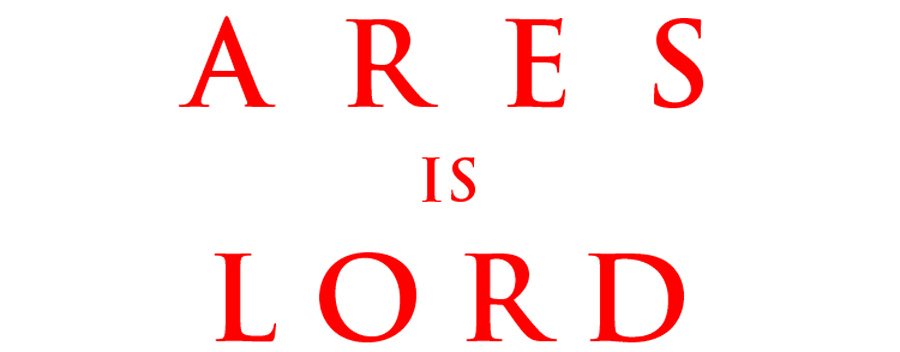

Bill Weintraub

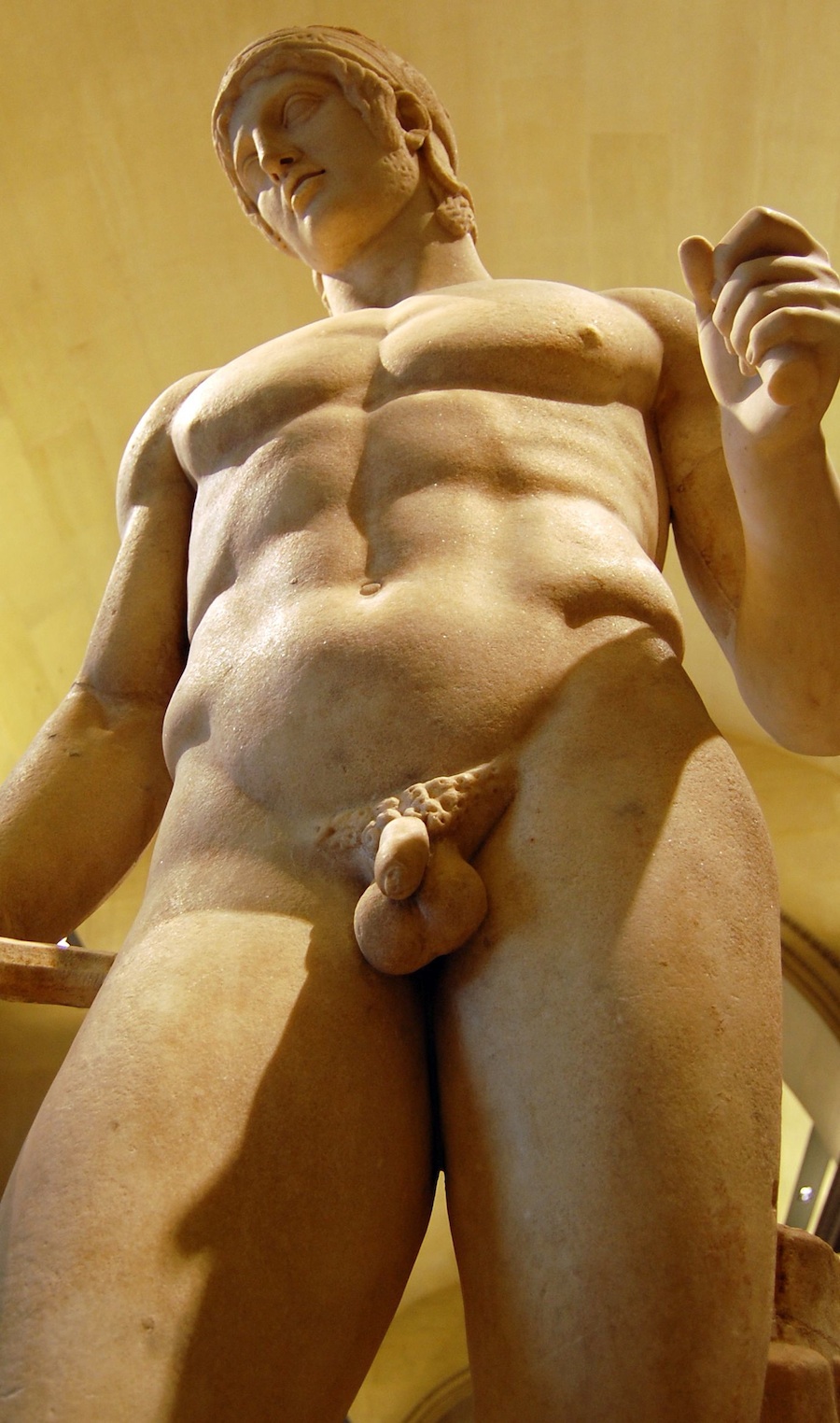



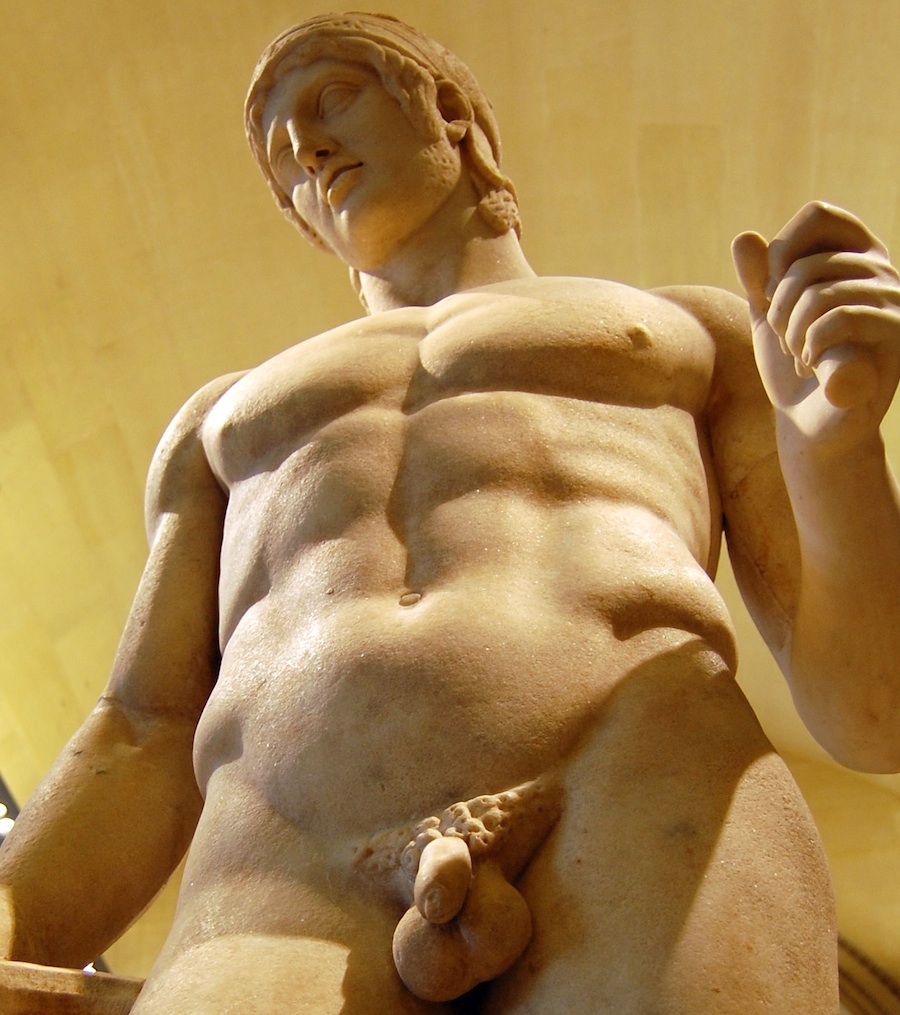



Eury-bia-das was the name of the Spartan in over-all command of the Greek forces at the time of the Battle of Salamis ; historian JE Lendon says that the name Alki-bia-des means Son of Violent Strength
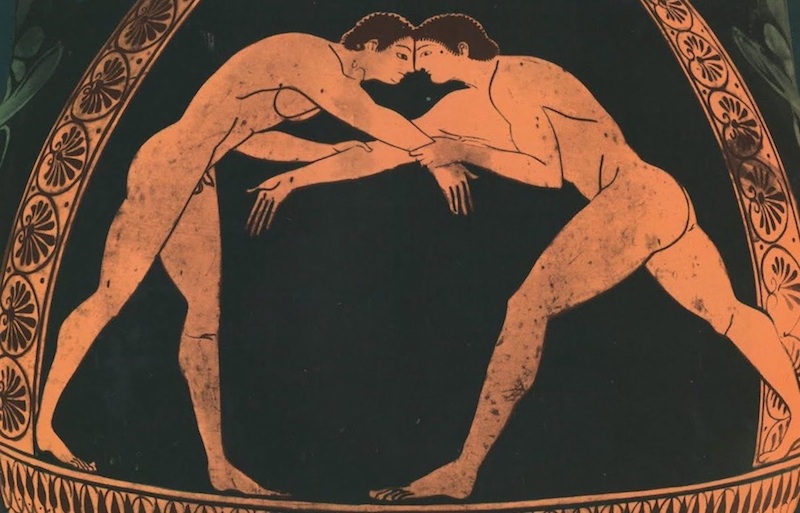
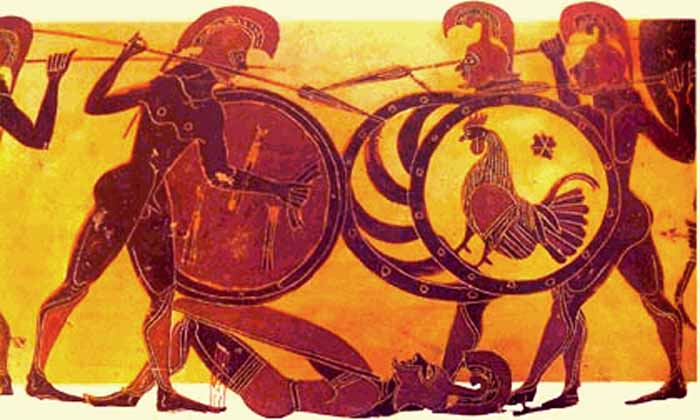
by driving them back with his inescapble hand.
Upon him the offspring [Kleandros] of his father's noble brother
casts no shame. Therefore, let one of his comrades,
in honor of the pankration, weave for Kleandros
a luxurious crown of myrtle,
since the contest of Alkathoos [another competition] and the youth
in Epidauros welcomed him before with good fortune.
A good man [agathos -- Manly Man] has the means to praise him,
for he has not suppressed [damazo -- repressed] in a hole [cheia]
a youth [heba] without experience of noble deeds [kalon].
for he has not suppressed in a hole
a youth without experience of noble deeds."
For further discussion of Pindar's treatment of Kleandros, see AGOGE IV : Excellence, Honour, and the Molding of Men
This name expresses the essence of the Greek view of Glory won in Battle :
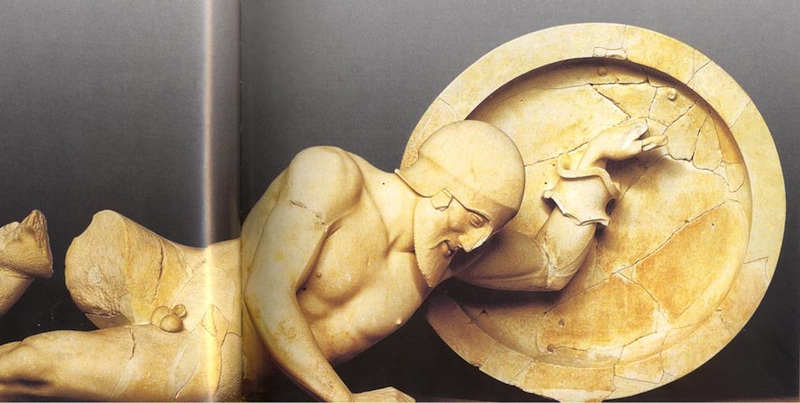
an anticipation of the future areté -- the future Manly Excellence, the future Fighting Manhood -- of its bearer ; it set, as it were, the ideal pattern for his whole life.
I bid you sing the reward for the four-horse chariot,
For a father's [Hieron's] victory is is no alien joy.
For whom Hieron founded that city with divinely fashioned freedom under the laws of Hyllos' rule,
Because the descendants of Pamphylos,
And indeed of Herakles' sons, who dwell under the slopes of Taygetos [ie, the Spartans],
Are determined to remain forever in the institutions of Aigimios
as Dorians.
Blessed with prosperity, they came down from Pindos and took Amyklai [home to the Hyakinthia],
To become much acclaimed neighbors of the Tyndaridai with white horses,
And the fame of their spears flourished and blossomed.
There were three Dorian tribes ; one was descended from Hyllos, Herakles' son, the other two from Pamphylos and Dymas, Aigimios' sons. Mt. Taygetos overlooks Sparta.
of the Phoenicians [ie, the Carthaginians] and the Etruscans may remain quietly
at home, now that they have seen it bring woe to their fleet before Kyme,
of the Syracusans [Hieron], who cast their youth
from their swiftly sailing ships into the sea,
and delivered Hellas from grievous slavery. I shall earn
from Salamis [where the Persian navy was defeated in 480 BC] the Athenians' gratitude
as my reward, and at Sparta I shall tell of the battle before Kithairon [ie, the b. of Plataia, where the Persian army was defeated in 479 BC]
in which battles the curve-bowed Medes [ie, the Persians] suffered defeat ;
but by the well-watered bank of the Himeras [the b. of Himera, where Gelon defeated an army of 100,000 Carthaginians in 480 BC] I shall pay
to Deinomenes' sons [Gelon and Hieron], the tribute of my hymn,
which they won through Areta -- Fighting Manhood -- when their enemies were defeated.
Bill Weintraub:
at West Point, . . . boxing did not show a higher rate of concussions than any other sport.
"I've been knocked out, given the smelling salts and shoved back in there -- that was our concussion protocol back then," he said in an interview. "I always thought it was a badge of honor when I got a concussion -- now you are one of the guys. You get knocked out and keep going."
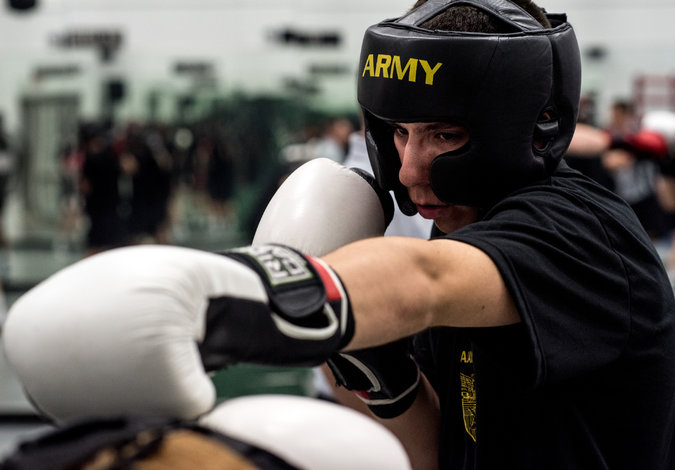
"I was livid, beside myself, in a panic," his mother said. "I knew he could be severely impacted, maybe for life, and for what? He is a math and science guy. This is the Air Force. He doesn't need to know how to box."
We teach one how to box, another how to compete in the pankration, so that they can become used to hard work, to stand up to blows face to face, and not to yield through fear of injury.
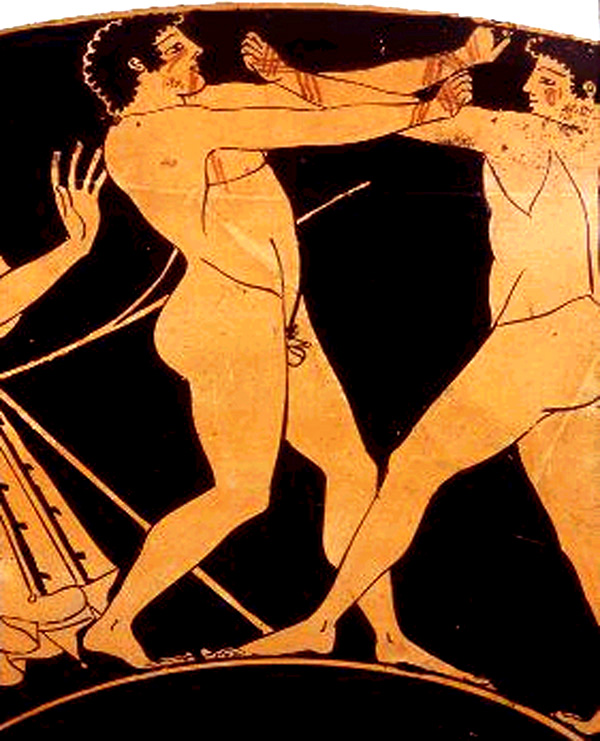
an anticipation of the future areté -- the future Manly Excellence, the future Fighting Manhood -- of its bearer ; it sets the ideal pattern for his whole life.
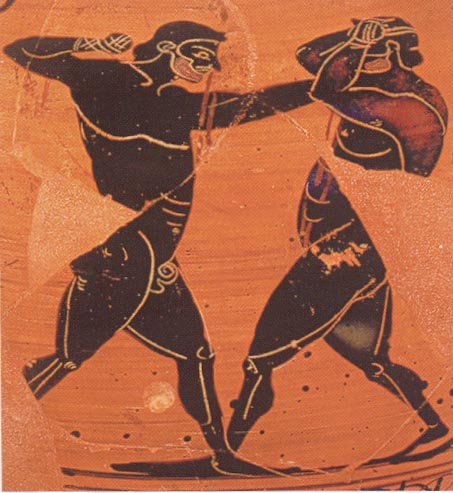
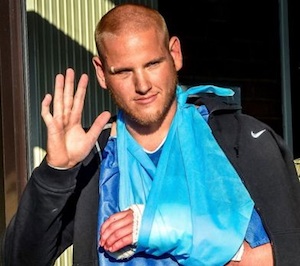

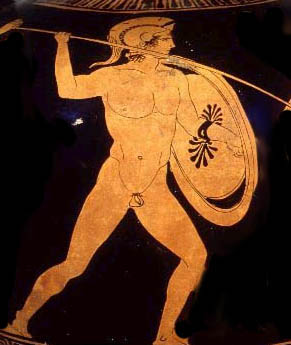
and instructs his son can in honoring his people
turn them to harmonious peace [symphonos hesychia].
of the Phoenicians [ie, the Carthaginians] and the Etruscans may remain quietly
at home, now that they have seen it bring woe to their fleet before Kyme,
of the Syracusans [Hieron], who cast their youth
from their swiftly sailing ships into the sea,
and delivered Hellas from grievous slavery. I shall earn
from Salamis [where the Persian navy was defeated in 480 BC] the Athenians' gratitude
as my reward, and at Sparta I shall tell of the battle before Kithairon [ie, the b. of Plataia, where the Persian army was defeated in 479 BC]
in which battles the curve-bowed Medes [ie, the Persians] suffered defeat ;
but by the well-watered bank of the Himeras [the b. of Himera, where Gelon defeated an army of 100,000 Carthaginians in 480 BC] I shall pay
to Deinomenes' sons [Gelon and Hieron], the tribute of my hymn,
which they won through Areta -- Fighting Manhood -- when their enemies were defeated.

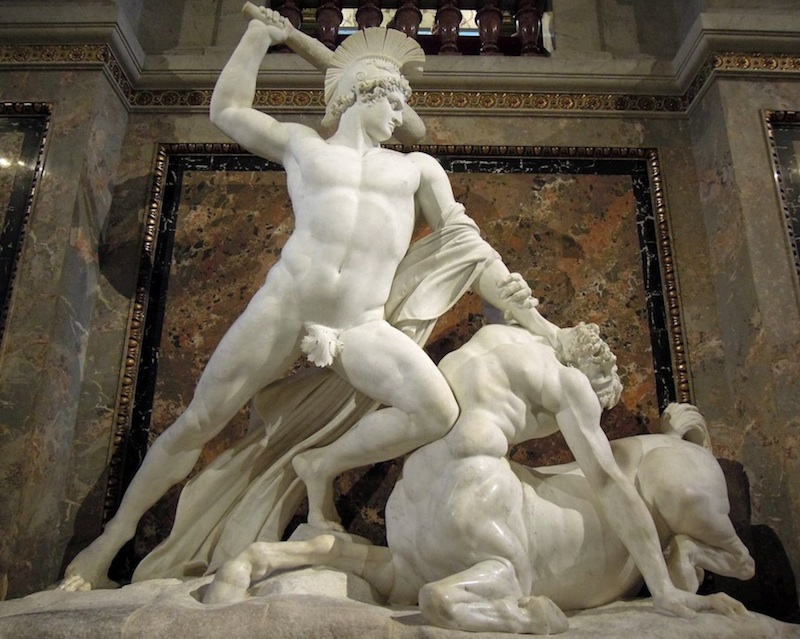
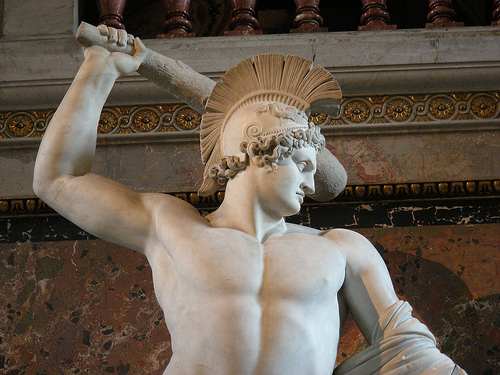
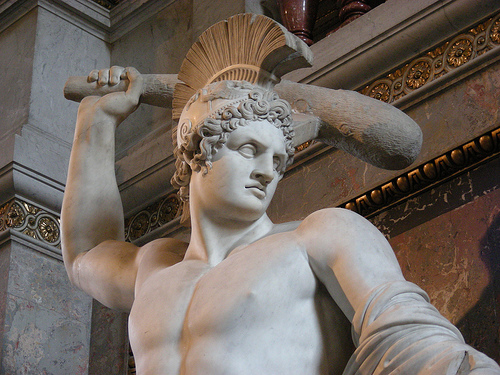






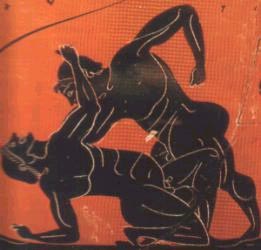
All rights reserved.
